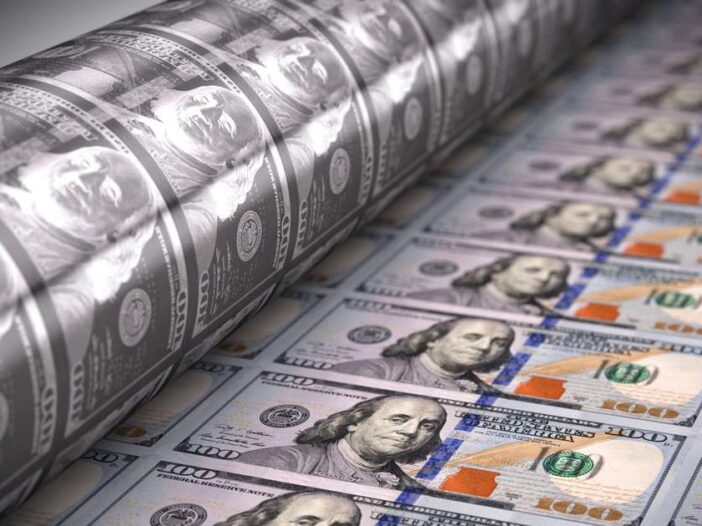Would you believe it? Printing copious amounts of cash doesn’t solve everything after all!
After more than a decade of QE, the markets are in complete chaos once again. And the economy is almost as bad.
Worst of all, the value of our money is plunging as well this time.
Actually, worst of all, the basic building blocks of life are all in a mess.
We’ll start with shelter. A home is absurdly unaffordable and in short supply in much of the developed world.
Building a new home is even worse — so bad that even builders are going bust like dominos.
So shelter is out. What about energy — the basic building block of life?
Well, we’re short on gas and coal after vilifying the companies and countries that produce them.
Nuclear power plants were never built or shut down and take time to revive. And so, we’re short on electricity.
We’re short on oil after claiming we won’t need it in 10 years’ time, anyway, causing oil producers to cut investment.
We’re short on refineries after shutting them down. We’re short on diesel after subsidising it because of pollution, and then discouraging it because of pollution.
But don’t worry, we’re short on petrol cars after plans to ban them in the future, so the petrol crisis isn’t a big problem after all.
What about food? Well, we’re short on fertiliser for sanctioning the world’s producer. And grain because of an attempt to expand NATO to its borders.
Then there’s the supply chain issue — how we actually get what we need. Well, we’re short on truckers after hiking their fuel costs. And we’re short on ships after blocking trade with lockdowns.
All around the world it’s an almighty mess.
And the central banks’ solution to all these problems? Let them eat cash!
Even Marie Antoinette would’ve been embarrassed by the suggestion that printing money would save us from everything. Unlike cake, you can’t even eat cash.
But wait a minute. It’s no wonder the toilet paper shortage is the one thing that has been alleviated. It’s the one thing you can substitute cash for…
And at the rate inflation is going…
But enough humour.
Actually, laughing is the only thing you can do these days.
The world’s consumers would be burning effigies of their politicians and central bankers if only enough fuel could be found.
And if you can find it, it’s too expensive to waste on political symbolism. At least, that’s how I feel here in Australia.
I left the country about four years ago. This week, I filled my new car for the first time. The same 60 litres cost almost double what I remember from four years ago.
As for property prices, don’t get me started. At least the RBA does seem to be doing its best to solve that problem lately…
Electricity? I’m in the blackout prone zone of Eastern Australia, where energy companies refuse to produce power unless they can do so at a profit. Outrageous!
No power, no home and food and fuel disruptions. What more is the mob waiting for?
A few years ago, a storage company began advertising spaces with the sign, ‘The French aristocracy never saw it coming either’. It’s a reminder that, when things get drastic, people go looking for someone to blame.
Sure enough, the top story on Bloomberg a few days ago was about central bankers getting the blame for inflation. And in Australia, the head of the RBA was hauled in front of the cameras to explain himself.
He claimed that his promise to keep interest rates at zero until 2024 was a ‘conditional statement’. Great…
Targeting central bankers for blame is an interesting new twist. Until now, the same policies were heralded as saving the world, literally.
Actually, the twist in fortunes of central bankers is an old one, but it hasn’t been around for a long time. The last central banker to be burned in effigy was Paul Volcker in the ‘70s. And he’s the one that our new Federal Reserve chair is supposedly imitating.
But it’s not the American central bank I want to tell you about today. Consider what’s going on in Japan.
Last week, a Japanese tax accountant messaged me: ‘I’m afraid of the collapse of the Japanese economy…’. The message wasn’t entirely random. I’d asked him about the crashing yen and the latest outbreak of insanity at the Bank of Japan.
While the rest of the world is busy trying to bring down inflation thanks to a global energy crisis, the country which is famously dependent on importing energy is busily loosening monetary policy even more…
But back to the Japanese tax accountant for a moment. Our conversation about Japanese monetary policy started a few months ago, as these things do, when we were out drinking in small-town Japan. I asked my friend, whose name means ‘three rounds’ in Japanese, about Kuroda-san.
The head of Japan’s central bank is a household name in Japan. And being a household name is never a good thing for the head of a central bank. But, in this case, Kuroda-san is quite famous globally too. Which is really, really bad.
What makes Kuroda-san so special internationally, as far as I can tell, is a typical Japanese behaviour. It is usually misinterpreted by Westerners, leading to severe misunderstandings and, occasionally, marriage.
In Japan, laughter is about dealing with awkwardness. Japanese people laugh when they’re embarrassed. Which only ever happens when they try to speak English, of course…
Now, Kuroda-san has a habit of laughing like a maniac whenever he tries to speak English. Which usually happens when he’s on Western TV making comments about Japanese monetary policy.
He thinks the laughter is making light of his broken English — a way to defuse any misunderstanding, excuse any miscommunication, or avoid any unintended misinterpretation.
Unfortunately, laughing like a maniac while discussing your own monetary policy for the world’s most indebted government is interpreted very differently by Western people…
Cue the collapse in the yen as the Bank of Japan tries to pin down Japanese bond yields.
We’ll get to how bad this crash is in a moment, and why it should scare you. First, consider the situation the Bank of Japan is in — it’s certainly no laughing matter, as awkward as it may be.
Japan’s government debt is terrifyingly high. If interest rates rise, the cost of paying interest will be downright dangerous.
And so, the Bank of Japan is trying to cap government bond yields at 0.25%. It’s buying however many government bonds it needs to in order to keep yields that low. It’s both funding the government and keeping the government’s borrowing costs down in one fell QE.
But financial markets aren’t buying it — literally in this case. They don’t think the Bank of Japan can keep yields that low with energy prices triggering high inflation worldwide, even in places that export the energy Japan imports.
Even the Japanese tax accountant doesn’t believe the inflation statistics anymore, he told me.
And so, investors are selling out of Japanese bonds in anticipation of the Bank of Japan having to raise interest rates and crash their own bond market as the US, UK, Eurozone, and Australia have.
For now, fighting the speculative attack on their government bond market is forcing the Bank of Japan to create vast amounts of yen to buy Japanese government bonds. And that increase in the amount of yen is causing its value to crash on foreign exchange markets.
The problem here is highlighted in the headline from Markets Insider: ‘The Japanese yen used to be a “safe haven”. But it has just crashed to a 20-year low’.
This causes a lot of different problems. The yen’s crash disrupts trade because Japan is an export powerhouse, for example. But there are more interesting angles…
Japan lends a lot of money to the world. It’s been the world’s top creditor for 31 years in a row!
So instability in Japan is a major problem for anyone around the world trying to finance themselves. Which is anyone, at this point, thanks to crashing bond markets just about everywhere.
What if Japan is currently revealing that, when push comes to shove, central bankers will always back their mates at the Treasury over those of us who need our money to maintain its purchasing power?
That is, after all, what tends to happen historically. Not many currency systems opted for government insolvency when faced with a crisis. They prefer to print and trash the value of the currency instead.
Japan might be signalling where we’re all headed in the end.
Until next time,
 |
Nickolai Hubble,
Editor, The Daily Reckoning Australia Weekened
PS: If you’re enjoying The Daily Reckoning Australia, we’d love for you to help us spread the word. Share this link with anyone who might enjoy us too: https://go.fattail.com.au/DRAUS

